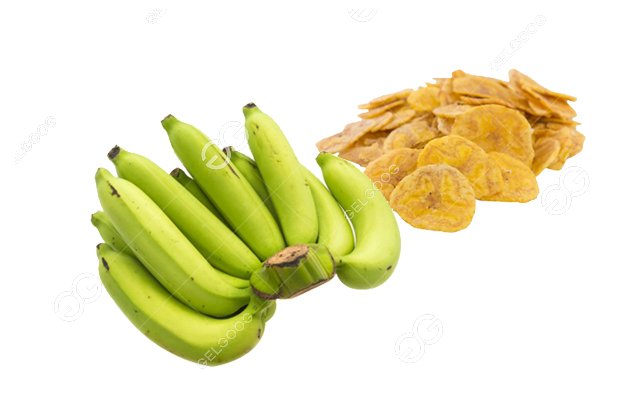What Is The Production Process of Plantain Chips?
Plantain chips, a popular and tasty snack enjoyed by many around the world, are made from green plantains. The production of plantain chips has evolved over the years, with modern factories employing advanced techniques to ensure consistency in taste, quality, and hygiene. In this article, we will take a closer look at what is the production process of plantain chips, the production process always do by automatic plantain chips production line.

Raw material selection
The process begins with the careful selection of green plantains. Quality control is paramount in ensuring that only the best plantains are used.
Peeling and slicing
After selection, the plantains are washed and then peeled. In a modern factory, automated peeling machines are often used to increase efficiency. Once peeled, the plantains are sliced into thin, uniform pieces. Advanced slicing machines are employed to achieve the desired thickness and consistency in the slices.
Pre-treatment
To enhance the flavor and shelf life of the plantain chips, they are typically pre-treated. This process often involves immersing the sliced plantains in a solution that may contain salt, sugar, and sometimes citric acid. This not only enhances the taste but also acts as a preservative.
Frying
The heart of the production process is the frying of the sliced plantains. In a modern factory, large fryers with precise temperature control mechanisms are used. The sliced plantains are submerged in hot oil, usually palm or vegetable oil, until they achieve the desired crispness and golden color. The frying time and temperature are carefully monitored to maintain consistency.
Seasoning
Once the plantain chips are fried to perfection, they are moved to a seasoning station. Here, various flavors and seasonings can be added, depending on the product's intended taste. Common seasonings include salt, pepper, garlic, or even spicier options for those who enjoy a kick of heat.
Packaging
After seasoning, the plantain chips are conveyed to the packaging area. In modern factories, automated packaging machines are used to ensure efficiency and consistency. The chips are often sealed in airtight bags or containers to maintain their freshness and crispiness.
Quality control
Throughout the production process, quality control measures are in place. Modern factories employ stringent quality checks to ensure that the plantain chips meet the desired standards for taste, texture, and hygiene. Any defective batches are rejected.
The production of plantain chips in a factory involves a series of well-organized and technologically advanced steps, from the selection of raw materials to packaging and distribution. These factories have embraced automation and quality control measures to ensure that plantain chips maintain their delicious taste and quality while meeting the demands of a growing market.
